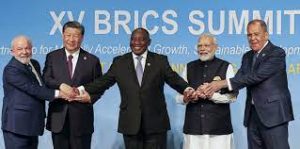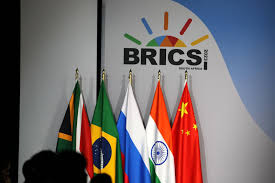A wall of BRICS: Expansion of BRICS: Alliance becoming a strong voice of the Global South
 BY VINAY KUMAR
BY VINAY KUMAR
NEW DELHI : August 26: The 15th BRICS Summit which concluded in Johannesburg earlier this week has made its mark in terms of the relevance of the five-nation grouping and making it a considerable counterweight to the Western world-led elite grouping of G-7 and other forums like the World Bank.
The major highlight of the just-concluded BRICS Summit was the decision to invite six other nations to join the grouping from January 1 next year thereby expanding the reach and influence of the grouping. The six nations invited to join the BRICS are major mid-East players — Egypt, Iran, Saudi Arabia, the United Arab Emirates and also Ethiopia from Africa and Argentina from South America. Six were selected after “BRICS countries reached consensus on the guiding principles, standards, criteria and procedures of the BRICS expansion process” – but did not provide more details about the specific criteria
Formed in 2009 as BRIC, the grouping began as Brazil, Russia, India and China got together but added South Africa a year later, making it the BRICS. The 15th Summit in South Africa was held in physical form after a gap of three years owing to the shadow cast upon by the Covid-19 pandemic which prevented the gathering of the grouping’s top leaders in physical form.
The BRICS has weathered many ups and downs and after deliberations on the scope of its expansion by its sherpas which had gone on for the past three years, the consensus emerged to invite the six nations to join the alliance. As many as 43 countries are said to have evinced keen interest in joining the alliance and 23 countries had put in formal applications. The decision to expand the BRICS from 5 to 11 carries a lot of significance for the nearly 15-year-old alliance and would be watched keenly by the rest of the world.
There is no doubt that the expansion of the BRICS is a welcome step which will lend more weight to the grouping as it becomes a powerful Voice of the Global South. However, there are some concerns as well, point out strategic analysts, by underlining the increasing influence of China which has now become a 19 trillion dollar economy. As the war in Ukraine rages on, Russia and China have become closer while China and India ties are wading in troubled waters and remain tense due to the Chinese actions in India’s Eastern Ladakh and tension building up along the Line of the Actual Control (LAC). India has asserted that its relations with China cannot be normal till the time the situation along the LAC normalises. BRICS member nations account for one quarter of the world’s GDP and 40 percent of the world’s population. After addition of the six new members it would cover nearly half of the world’s population.
Strategic analysts say that the expansion of the BRICS also indicates increasing anti-US sentiment across the world and stresses upon the multipolarity. Though at earlier stages, India was not favorable in agreeing to expansion of the grouping but it worked for evolving consensus on it. The expansion was also driven by China which wanted to bring more nations into the fold of BRICS. India’s stand on the consensus was voiced firmly by Prime Minister Narendra Modi at the 15th Summit in South Africa, Mr Modi also stressed that the expansion was in keeping with the changing times in today’s world.
The BRICS will not only emerge as an assertive voice of its members in world affairs but also hold out the promise of shared prosperity and increased economic cooperation in multiple sectors among its member nations. (ENDS)
(The writer is a senior journalist based in Delhi.)

